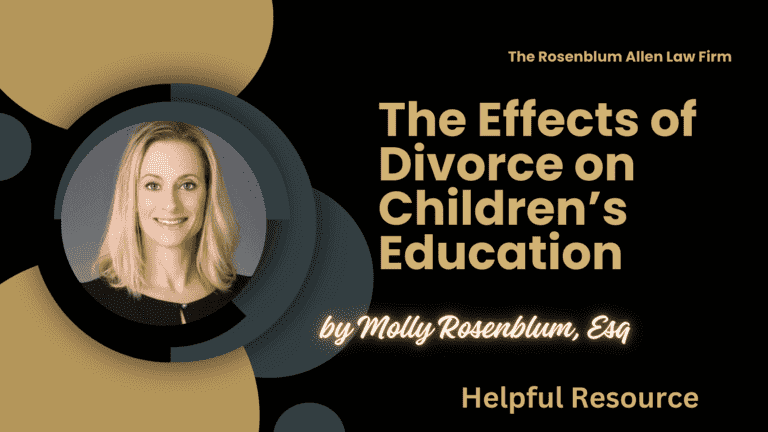Understanding Divorce Effects on Children's Education
Are you wondering what will happen to kid’s education if you go through with your divorce?
It can be a challenging time for everyone, especially regarding your children’s education.
Many kids across the globe go through this, so it’s essential to understand their feelings and how it can affect their school life.

Understanding the Emotional Impact of Divorce on Children
The Feelings Rollercoaster
Imagine being on a wild rollercoaster — that’s what it can feel like for kids when their parents split up. They might feel sad, mad, or even confused. All these zig-zag feelings can make it hard to concentrate on homework or listen to the teacher.
Why Feeling Safe and Sound Matters
Kids do their best when they know what to expect at home, like who will help with homework or what time dinner is. When things change a lot, like during a divorce, someone shakes their daily schedule like a snow globe! That can make school and life in general a lot harder.
When Mom and Dad Disagree
It’s tough for kids when their parents argue a lot. They might feel like they’re stuck in the middle of a tug-of-war game. This can make them stressed, and spelling tests and math problems get a lot trickier when kids are stressed.
Changes in Family Dynamics and Their Educational Implications
New Houses and Homework
Sometimes, kids have to switch between their parent’s houses after a divorce. Imagine remembering where you left your your school books! This can make keeping up with schoolwork hard.
Money Matters
If there’s less money to go around after a divorce, kids might not have as many books or might miss out on some after-school activities. Money can be tight, meaning fewer learning tools and fun activities.
Who Helps with Homework?
As a parent you can help with school stuff, like ensuring homework gets done. But after a divorce, you might be busy or emotional, which can mean you can’t help as much as before. Your kids might feel like doing a giant puzzle without all the pieces.

Social Consequences of Divorce on School-Aged Children
Staying Friends and Making New Ones
Being friends with other kids at school is a big deal! But when your family changes, sometimes friendships can change, too. Kids might move to a new school or feel different from their peers, which can be lonely.
Feeling Different Can Be Tough
After a divorce, some kids might feel like they’re the only ones without a “normal” family. They might worry about what other kids think, which can make them feel super alone at school.
Academic Performance and Cognitive Development
Report Cards and Test Scores
Kids going through a divorce might see their grades dip like a rollercoaster. It’s like trying to read a book during a movie – it’s super hard to focus!
Learning New Stuff Can Get Tough
When there’s a lot of drama at home, learning new things like fractions or science facts can feel like trying to catch a fly—frustrating! Their brains are so busy with home worries that school can seem much harder.
Remembering and Thinking
Did you ever walk into a room and forget why you went there? That’s what stress can do to your brain. For kids dealing with divorce, it’s like that, but it happens a lot. They might forget their homework or what the teacher just explained.

Behavioral Issues Stemming from Divorce
Acting Out in Class
Some kids might start acting like the class clown or not following the rules because they’re upset or confused.
Time-Outs and Talks with the Principal
Kids going through tough times at home might end up in the principal’s office more than they used to. It’s not that they’re bad kids; they’re just trying to figure out how to deal with those big feelings.
How Can We Make Things Better?
Teachers and parents can do extraordinary things to help kids stay on track. Like a superhero team, they can work together to ensure the kids have what they need, like extra time for homework or someone to talk to when things get too much.

Support Systems and Interventions
Support Systems and Interventions Teachers and Counselors to the Rescue!
Schools have amazing people who can help, like teachers who give extra high-fives and counselors who are great listeners. They’re like the coaches in life’s big game, assisting kids to play their best.
Talking It Out Helps
Sometimes, talking to someone who knows about feelings — like a therapist — can make a huge difference.
Community Heroes
There are also places outside school, like community centers, where kids can join clubs or sports. These spots are like bonus levels in a game, offering extra points (or, in this case, smiles and friends) to help kids feel better.

Legal Considerations and Educational Rights
Who Decides About School Stuff?
When parents live apart, they must decide who makes the big choices, like where the kids go to school. Sometimes, a judge helps you decide, so it’s fair.
Helping Kids Speak Up
Sometimes, kids need to talk about what they want, like staying at their old school or going to a different one. Lawyers and judges can help make sure kids are heard.

Breaking It All Down for You
Wrapping It All Up
We’ve talked about how kids feel when their parents aren’t together anymore and how it can make school a bit more tricky.
It’s like juggling soccer balls, homework, and feelings all at the same time!
Teamwork Makes the Dream Work
It’s super important that everyone — parents, teachers, and even friends — work together like a dream team. This way, your kids can get through the tough stuff and keep smiling and learning.
Keep Learning and Growing
Sometimes, it just takes a little help from the heroes around us.
So, keep your cape ready, and let’s keep flying high at school and in life!

Frequently Asked Questions
Can children of divorced parents still do well in school?
Absolutely! While it might be a bit harder when they’re dealing with family changes, many kids of divorced parents keep rocking it at school. With support from everyone around them, they can still hit home runs in reading, writing, and arithmetic.
How can a child’s relationship with their teachers change after their parents divorce?
Kids might need to lean on their teachers more, like when you need an extra hand climbing the monkey bars. Teachers can become someone they trust to talk about their feelings or get extra help with schoolwork.
What can schools do to support children going through their parents’ divorce?
Schools can be superstars by offering a buddy system, having fun group activities, or even giving kids a quiet place to chill out when things feel too loud. They can also have special talks that help everyone understand what it’s like when parents live apart.
Are there books or resources for children to help them understand divorce?
Yes, there are tons of books out there that are like treasure maps, guiding kids through the mysteries of divorce. Libraries and bookstores have sections just for kids going through tough times. These books can be like friends who understand exactly what you’re feeling.
How can other kids in the classroom support their classmates experiencing divorce?
Other kids can be awesome sidekicks by being kind, including everyone in games, and listening. It’s like being part of a superhero team where everyone has each other’s back.
Should kids of divorced parents be given special allowances for assignments and tests?
Sometimes, like when someone has a broken arm and needs a little extra time to write, kids dealing with big emotions might get more time on tests or help with their homework. It’s not about being unfair; it’s about giving everyone what they need to succeed.
What can divorced parents do to minimize the impact on their child’s education?
Parents can be like coaches, working out a game plan together. They can keep routines as normal as possible, share the job of homework help, and make sure they’re both cheering from the stands during school events.
Can changes in custody arrangements affect a child’s academic routine?
For sure. It’s as if you were used to having pizza every Friday, and suddenly, it’s taco Tuesday instead. Kids might need time to adjust to new schedules and homes, but they’ll find their groove again with love and patience.
How can parents communicate with the school about their divorce?
It’s like dropping a note in the suggestion box. Parents can talk to the teacher or school counselor to let them know what’s going on. This way, the school can watch for changes in how the child is doing in class or with friends.
What role can extended family members play in a child’s educational success after divorce?
Grandmas, grandpas, aunts, and uncles can be like substitute players, stepping in to help with homework or listening to how a child’s day went. The more cheerleaders, the better!
Is it normal for children to be reluctant to talk about their feelings regarding their parents’ divorce?
Yep, it’s normal. Sometimes, kids keep their feelings inside, like a secret base in a video game. That’s why having adults they trust to talk to can help them open the door to that base when they’re ready.

Glossary
Academic Performance: This is how well a student does in their school work. It’s like a scorecard that shows if you’re hitting all the correct answers and turning in your homework on time.
Behavioral Issues: These are problems with following rules or acting as people expect. Think of it like playing a game but not sticking to the rules – it can cause some trouble.
Cognitive Development: This is how our brains grow to help us think, learn, and remember things. It’s like leveling up in a video game, where you get more innovative and better at solving puzzles.
Counselors: These special helpers at school listen and give advice when things are tough. They’re like guides on a mountain hike, helping you find the best path.
Divorce happens when two parents decide not to be married anymore and live apart. It’s like deciding not to play on the same team, but you still have to work together for the kids.
Educational Rights: These rules ensure kids can go to school and learn no matter what happens at home. It’s like a pass that lets you into the amusement park – everyone has a right to be there.
Interventions: These are actions to help someone, like extra tutoring or talking with a counselor. Imagine being stuck on a level in a game; an intervention is like getting a hint to help you move forward.
Legal Considerations: These are the laws and rules that must be considered when parents get divorced. It’s like the instructions on a board game – you have to follow them so everything is fair.
Learning New Stuff means learning things you didn’t know before, like math problems or science facts. It’s the same as discovering new levels in a game or a hidden area on a map.
Report Cards: These are like progress reports that tell you how well you’re doing in school. It’s like a scoreboard showing your points at the end of a game.
Stress is the feeling you get when you’re worried or nervous about something. Imagine carrying a backpack that’s way too heavy – that’s stress.
Support Systems: These are the people and services there to help you, like family, friends, teachers, and counselors. They’re like a safety net when you’re walking on a tightrope.
Test Scores: These results you get after a test, showing how many answers you got right. Think of it as the points you earn after completing a game challenge.
Therapist: This person is trained to listen and help you work through your feelings. They’re like a personal trainer for your emotions.
Community Centers: These are places where you can meet people, play sports, or do fun activities. It’s like a clubhouse where everyone can join the fun.
Additional Resources for You

We are proud to remind our readers that our lead attorney, Molly Rosenblum Allen, Esq., is not only a dedicated legal professional but also a creator of a wealth of resources designed to assist you during challenging times. With a deep understanding of the complexities and emotional toll of divorce, Molly has developed a comprehensive suite of guides and articles. These resources are crafted to provide you with the knowledge and support you need to navigate your situation effectively.
Las Vegas Divorce Attorney: If you’re facing divorce proceedings in Las Vegas, this resource is tailored specifically for you, providing essential information and guidance. Read more.
How to Cope with Divorce: Divorce can be an emotionally draining experience. This guide offers practical advice and strategies to help you cope with the emotional aspects of divorce. Read more.
Social Media and Divorce: In the digital age, social media can have a significant impact on divorce proceedings. Understand the do’s and don’ts through this insightful article. Read more.
Moving On After Divorce from a Narcissist: Divorcing a narcissist comes with unique challenges. This resource provides guidance on navigating the aftermath and moving forward. Read more.
Introducing New Partner to Child After Divorce: Transitioning to a new life involves significant changes, including introducing new relationships to your children. Learn how to do this smoothly and effectively. Read more.
Child Therapy and Divorce: Explore the benefits of child therapy during and after divorce, ensuring your child’s mental and emotional well-being. Read more.
Rebuilding Social Life After Divorce: Divorce can lead to social isolation for some. Discover strategies to rebuild and enhance your social life post-divorce. Read more.
Signs Your Child is Struggling with Your Divorce: Recognize the signs of distress in your child due to the divorce and learn how to provide the necessary support. Read more.
Top Tips For Parenting Through Divorce: Parenting during divorce can be challenging. This guide offers top tips to manage parenting duties effectively amidst the divorce process. Read more.
Managing Stress and Emotions During Divorce: It’s crucial to manage your stress and emotions for your well-being during divorce. This resource provides strategies to help you cope. Read more.
Molly Rosenblum Allen, Esq. is committed to providing not just legal representation but also comprehensive support to navigate the personal challenges of divorce. Each of these resources is designed to address different aspects and stages of the divorce process, ensuring that you have the support and information you need every step of the way.

Offsite Resources You May Find Helpful
Here are some offsite resources that offer valuable information on divorce and related topics. Each resource can provide additional insight and guidance:
American Academy of Matrimonial Lawyers: A prestigious national organization composed of highly skilled negotiators and litigators who represent individuals in all facets of family law. Visit AAML.
National Domestic Violence Hotline: A vital resource for individuals facing domestic abuse, offering confidential help and support. Access the Hotline.
Family Law Section of the American Bar Association: This section provides resources for family law practitioners and those interested in family law issues, such as divorce. Explore ABA Family Law.
International Academy of Family Lawyers: An international association of practicing lawyers who are recognized by their peers as the most experienced and skilled family law specialists in their respective countries. Learn from IAFL.
National Council of Juvenile and Family Court Judges: Dedicated to ensuring justice for families and children in courtrooms across the United States. Visit NCJFCJ.
Institute for Divorce Financial Analysts: Specializing in financial planning for divorce, the IDFA provides access to qualified specialists who can help manage divorce-related financial issues. Check out IDFA.
These resources can be a great help to readers seeking further information and assistance on matters related to divorce.

A Special Message From Our Lead Attorney
Why You Might Need a Lawyer
Molly Rosenblum, Esq

Dear Reader,
Thank you sincerely for taking the time to engage with our divorce resources. I hope you have found them insightful and helpful as you navigate this challenging chapter of your life.
My team and I understand that each situation is unique, and we are here to provide the personalized support and legal expertise you need.
If you’re ready to discuss the specifics of your case and explore how we can assist you, please do not hesitate to reach out.
Call us at (702) 433-2889 to get the ball rolling on your situation. We are committed to offering guidance tailored to your circumstances with the dedication and thoroughness your case deserves.
I am looking forward to the opportunity to work with you.
Warm regards,
Molly Rosenblum, Esq.




